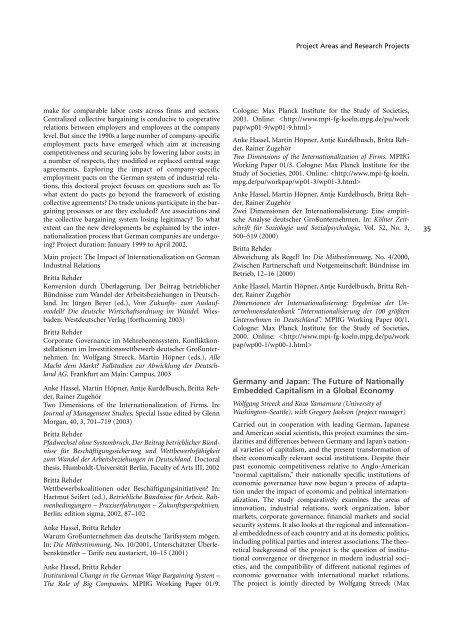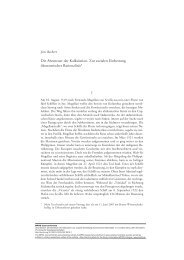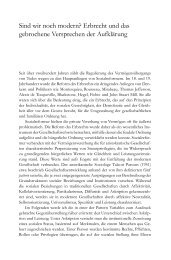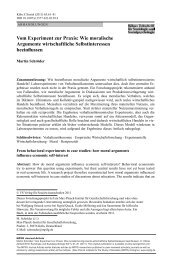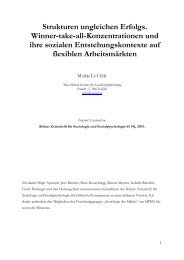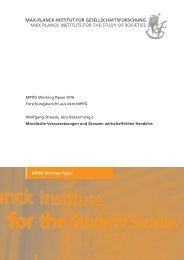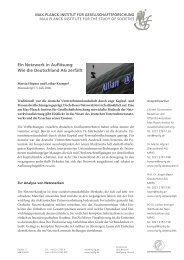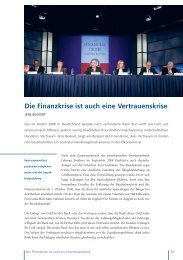Publications - MPIfG
Publications - MPIfG
Publications - MPIfG
You also want an ePaper? Increase the reach of your titles
YUMPU automatically turns print PDFs into web optimized ePapers that Google loves.
make for comparable labor costs across firms and sectors.<br />
Centralized collective bargaining is conducive to cooperative<br />
relations between employers and employees at the company<br />
level. But since the 1990s a large number of company-specific<br />
employment pacts have emerged which aim at increasing<br />
competitiveness and securing jobs by lowering labor costs; in<br />
a number of respects, they modified or replaced central wage<br />
agreements. Exploring the impact of company-specific<br />
employment pacts on the German system of industrial relations,<br />
this doctoral project focuses on questions such as: To<br />
what extent do pacts go beyond the framework of existing<br />
collective agreements? Do trade unions participate in the bargaining<br />
processes or are they excluded? Are associations and<br />
the collective bargaining system losing legitimacy? To what<br />
extent can the new developments be explained by the internationalization<br />
process that German companies are undergoing?<br />
Project duration: January 1999 to April 2002.<br />
Main project: The Impact of Internationalization on German<br />
Industrial Relations<br />
Britta Rehder<br />
Konversion durch Überlagerung. Der Beitrag betrieblicher<br />
Bündnisse zum Wandel der Arbeitsbeziehungen in Deutschland.<br />
In: Jürgen Beyer (ed.), Vom Zukunfts- zum Auslaufmodell?<br />
Die deutsche Wirtschaftsordnung im Wandel. Wiesbaden:<br />
Westdeutscher Verlag (forthcoming 2003)<br />
Britta Rehder<br />
Corporate Governance im Mehrebenensystem. Konfliktkonstellationen<br />
im Investitionswettbewerb deutscher Großunternehmen.<br />
In: Wolfgang Streeck, Martin Höpner (eds.), Alle<br />
Macht dem Markt? Fallstudien zur Abwicklung der Deutschland<br />
AG. Frankfurt am Main: Campus, 2003<br />
Anke Hassel, Martin Höpner, Antje Kurdelbusch, Britta Rehder,<br />
Rainer Zugehör<br />
Two Dimensions of the Internationalization of Firms. In:<br />
Journal of Management Studies, Special Issue edited by Glenn<br />
Morgan, 40, 3, 701–719 (2003)<br />
Britta Rehder<br />
Pfadwechsel ohne Systembruch. Der Beitrag betrieblicher Bündnisse<br />
für Beschäftigungssicherung und Wettbewerbsfähigkeit<br />
zum Wandel der Arbeitsbeziehungen in Deutschland. Doctoral<br />
thesis. Humboldt-Universität Berlin, Faculty of Arts III, 2002<br />
Britta Rehder<br />
Wettbewerbskoalitionen oder Beschäftigungsinitiativen? In:<br />
Hartmut Seifert (ed.), Betriebliche Bündnisse für Arbeit. Rahmenbedingungen<br />
– Praxiserfahrungen – Zukunftsperspektiven.<br />
Berlin: edition sigma, 2002, 87–102<br />
Anke Hassel, Britta Rehder<br />
Warum Großunternehmen das deutsche Tarifsystem mögen.<br />
In: Die Mitbestimmung, No. 10/2001, Unterschätzter Überlebenskünstler<br />
– Tarife neu austariert, 10–15 (2001)<br />
Anke Hassel, Britta Rehder<br />
Institutional Change in the German Wage Bargaining System –<br />
The Role of Big Companies. <strong>MPIfG</strong> Working Paper 01/9.<br />
Project Areas and Research Projects<br />
Cologne: Max Planck Institute for the Study of Societies,<br />
2001. Online: <br />
Anke Hassel, Martin Höpner, Antje Kurdelbusch, Britta Rehder,<br />
Rainer Zugehör<br />
Two Dimensions of the Internationalization of Firms. <strong>MPIfG</strong><br />
Working Paper 01/3. Cologne: Max Planck Institute for the<br />
Study of Societies, 2001. Online: <br />
Anke Hassel, Martin Höpner, Antje Kurdelbusch, Britta Rehder,<br />
Rainer Zugehör<br />
Zwei Dimensionen der Internationalisierung: Eine empirische<br />
Analyse deutscher Großunternehmen. In: Kölner Zeitschrift<br />
für Soziologie und Sozialpsychologie, Vol. 52, No. 3,<br />
500–519 (2000)<br />
Britta Rehder<br />
Abweichung als Regel? In: Die Mitbestimmung, No. 4/2000,<br />
Zwischen Partnerschaft und Notgemeinschaft: Bündnisse im<br />
Betrieb, 12–16 (2000)<br />
Anke Hassel, Martin Höpner, Antje Kurdelbusch, Britta Rehder,<br />
Rainer Zugehör<br />
Dimensionen der Internationalisierung: Ergebnisse der Unternehmensdatenbank<br />
“Internationalisierung der 100 größten<br />
Unternehmen in Deutschland”. <strong>MPIfG</strong> Working Paper 00/1.<br />
Cologne: Max Planck Institute for the Study of Societies,<br />
2000. Online: <br />
Germany and Japan: The Future of Nationally<br />
Embedded Capitalism in a Global Economy<br />
Wolfgang Streeck and Kozo Yamamura (University of<br />
Washington–Seattle), with Gregory Jackson (project manager)<br />
Carried out in cooperation with leading German, Japanese<br />
and American social scientists, this project examines the similarities<br />
and differences between Germany and Japan’s national<br />
varieties of capitalism, and the present transformation of<br />
their economically relevant social institutions. Despite their<br />
past economic competitiveness relative to Anglo-American<br />
“normal capitalism,” their nationally specific institutions of<br />
economic governance have now begun a process of adaptation<br />
under the impact of economic and political internationalization.<br />
The study comparatively examines the areas of<br />
innovation, industrial relations, work organization, labor<br />
markets, corporate governance, financial markets and social<br />
security systems. It also looks at the regional and international<br />
embeddedness of each country and at its domestic politics,<br />
including political parties and interest associations. The theoretical<br />
background of the project is the question of institutional<br />
convergence or divergence in modern industrial societies,<br />
and the compatibility of different national regimes of<br />
economic governance with international market relations.<br />
The project is jointly directed by Wolfgang Streeck (Max<br />
35


